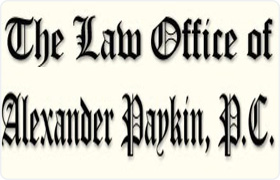 Bayville Foreclosure Lawyers, New York
Bayville Foreclosure Lawyers, New York
Sponsored Law Firm
-
 x
x

Click For More Info:
-
The Law Office of Alexander Paykin, P.C.
350 5Th Ave Fl 59 New York, NY 10118» view mapReal Estate Reliable. Dependable. Accessible.
Whether you are buying, selling, renting, or refinancing your house, our experienced legal team will strongly advocate for you at each and every step of the process.
800-747-9261
Lawyers
1-3 of 3 matches
Landlord-Tenant, Foreclosure, Credit & Debt, Bankruptcy
Commercial Real Estate, Foreclosure, Credit & Debt, Bankruptcy



 Alexander Paykin New York, NY
Alexander Paykin New York, NY AboutThe Law Office of Alexander Paykin, P.C.
AboutThe Law Office of Alexander Paykin, P.C. Practice AreasSpecializations
Practice AreasSpecializations